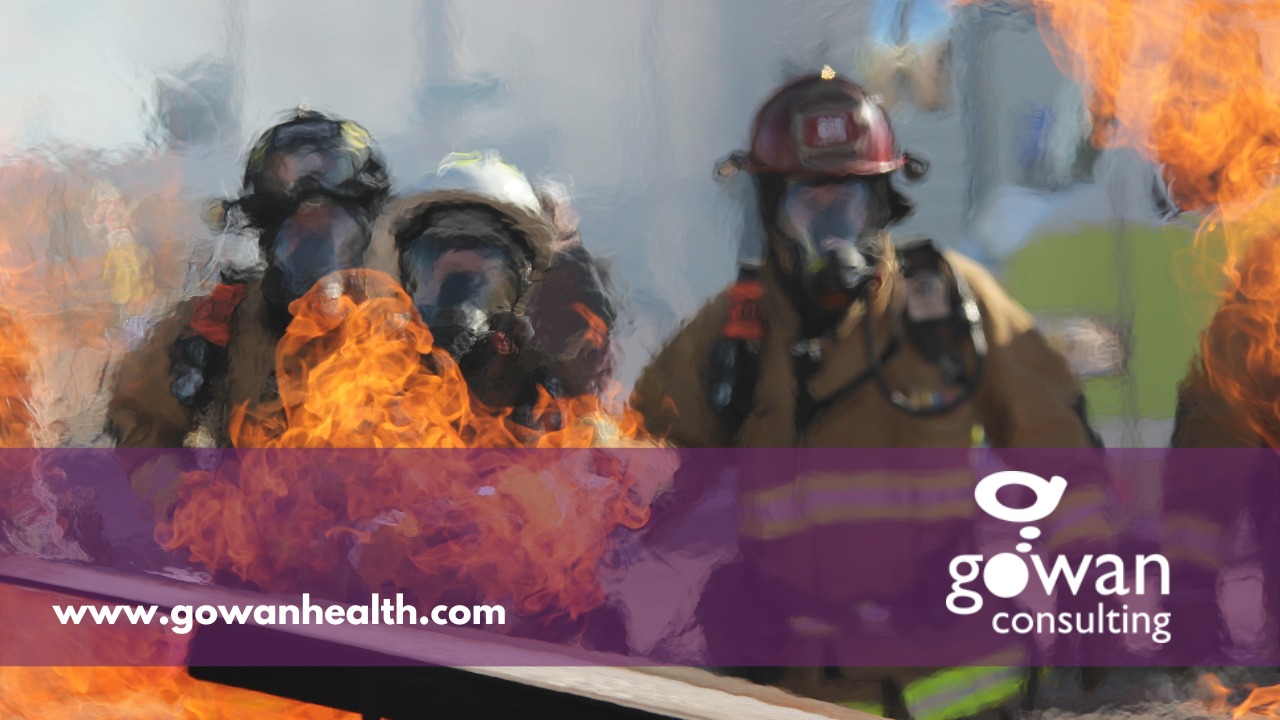Psychological Safety for First Responders
Aug 18, 2023
First responders, including police officers, firefighters, paramedics, and emergency medical technicians (EMTs), are at the forefront of ensuring public safety and well-being. Their roles involve confronting high-stress situations that most professionals rarely encounter. Due to the unique challenges they face, employees in these professions face shockingly high rates of burnout and compromised mental health compared to the general population. Studies have highlighted the prevalence of conditions such as post-traumatic stress disorder, compassion fatigue, depression, substance abuse, and suicidal ideation among these employees.
Tragically, the stigma attached to seeking help in such roles can act as a barrier. The very nature of their roles as aid-givers can instill a belief that they should not admit vulnerability or accept assistance themselves. Unfortunately, unhealthy workplace dynamics can perpetuate this belief.
With the average lifespan of a first responder averaging around just 6.5 years (or as low as 4 according to some estimates1), and with so many employees suffering in silence, workplaces need to prioritize psychological safety. Reducing stigma is the key for employees to reach out and get the help they need so they can continue doing what they do best: helping others.
Understanding the Unique Challenges of First Responders
Police officers and firefighters are more likely to die by suicide than in the line of duty.2 A concerning 85% of first responders have experienced symptoms related to mental health conditions, while depression and PTSD are up to five times more prevalent in this group compared to the general population.2 69% of EMS professionals report never having sufficient time to recover between traumatic events.3 72% of first responders report they sometimes, often, or always feel burned out.4
These staggering statistics underscore the mental strain these employees regularly endure. First responders encounter a range of experiences and circumstances that can contribute to poor psychological health. Their concerns revolve around:
- Traumatic incidents and exposure: First responders often face traumatic incidents, such as accidents, natural disasters, and acts of violence. They witness and directly engage with distressing scenes, exposing them to graphic injuries, loss of life, and emotional turmoil. This repeated exposure to trauma can lead to cumulative stress and potentially result in post-traumatic stress disorder (PTSD) or other psychological conditions.
- Critical decision-making under pressure: First responders must make split-second decisions in high-pressure situations, where lives are at stake. These decisions can have long-lasting consequences, both professionally and personally. The weight of responsibility can create a significant mental burden and cause self-doubt and anxiety.
- Irregular and unpredictable schedules: First responders often work extended shifts, including nights, weekends, and holidays. This irregular schedule can disrupt sleep patterns, limit quality time with loved ones, and contribute to fatigue, which further affects their overall well-being.
- Physical demands and occupational hazards: The physical demands of the job, such as lifting heavy objects, navigating dangerous environments, and prolonged periods of physical exertion, can take a toll on the physical health of first responders. They also face inherent occupational hazards, including exposure to hazardous substances, potential injuries, and the risk of violence from individuals they encounter.
Workplace Culture for First Responders
The workplace and its culture play a significant role in how first responders respond to challenges. While a sense of community and camaraderie can have a protective and positive impact on well-being, there are aspects of workplace culture that can have negative effects on mental health.
A major challenge has been the stigma around asking for help, which remains pervasive among first responders. Many individuals are hesitant to discuss mental health challenges due to fears of consequences like affecting their career prospects or relationships with managers and coworkers. With the role of a first responder being to help others, there is also a misconception that having a mental health condition is a sign of weakness. This stigma creates a significant hurdle, deterring workers from seeking the support they need.
More than 7 in 10 of these professionals express that they would be more inclined to seek professional counseling if a leader in their organization openly discussed their own mental health experiences.2 The influence of peers is even more potent, with 8 in 10 responders stating that if a close colleague spoke up about their mental health challenges, they would be encouraged to seek help for themselves.2 However, despite the potential benefits, 7 in 10 first responders admit that mental health services are seldom or never utilized.2
Alarmingly, recent surveys indicate that first responders are not just facing stigma but are also experiencing more active psychological harm than those in other professions. According to the June 2023 Psychological Health and Safety report by Mental Health Research Canada, 50% of first responders indicate they are being bullied on the job.4 48% said they are experiencing discrimination, 42% said they were being verbally, physically, or sexually harassed, and 73% said their work threatens their psychological health.4 These statistics underscore the need for a cultural shift within first responder organizations.
To ensure that employees are psychologically protected and supported before, during, and after trauma, organizations should focus on dismantling the harmful “tough it out” culture and proactively providing mental health intervention.
How Employers Can Promote Psychological Safety in the Workplace
Mental health promotion and prevention has positive effects on reducing stigma and increasing support in the workplace. Employers can implement the following strategies to foster psychological safety for first responders:
Prepare in advance for disasters:
Develop well-defined protocols ahead of disaster mobilization, gathering comprehensive information about the situation, engaging all team members in the process, and asking responders if they are psychologically prepared to deal with the impacts of their roles. These actions cultivate readiness, teamwork, and effective disaster management, which act as protective factors against poor mental well-being.3
Acknowledge and address trauma:
Create a culture that recognizes and acknowledges the potential impact of traumatic experiences on first responders and the need to act early. Implement debriefing sessions following stressful situations where they can openly discuss their emotions and experiences, reducing the burden of trauma. Provide access to mental health professionals who specialize in trauma-focused interventions.
Establish comprehensive wellness programs:
Develop holistic wellness programs tailored to the unique needs of first responders. These programs should address mental health and stress management techniques. Wellness initiatives should also incorporate emphasis on regular exercise, nutrition education, healthy sleep hygiene, mindfulness training, relaxation techniques, and the importance of taking breaks to support overall well-being.
Foster peer support networks and buddy systems:
Encourage the formation of peer support networks within the workplace. These networks provide first responders with a safe space to connect with colleagues who understand their experiences and can offer empathetic support. Peer support programs can significantly contribute to reducing feelings of isolation and promoting psychological resilience. Pairing up workers in a “buddy system” can help ensure that stress reactions are being monitored and that everyone is being supported.3
Invest in training and skills development:
Provide comprehensive training programs that address the unique challenges faced by first responders. This includes training on stress management, anti-stigma, resilience, emotional regulation, effective communication, and decision-making under pressure. Continuous skill development builds confidence, enhances performance, and reduces the psychological strain associated with critical decision-making. Training on signs of burnout, compassion fatigue, and mental illness can also help individuals and team members know when mental health assistance is needed.
Strengthen leadership and supervision:
Equip supervisors and leaders with the necessary training to effectively support the psychological well-being of first responders. Develop leadership qualities that prioritize empathy, active listening, and open communication. Encourage regular check-ins and provide opportunities for supervisors to address concerns, recognize achievements, empower staff, and offer constructive feedback.
Provide recovery time:
Strategies like implementing rotating schedules, mandatory time off policies, and flexible scheduling options can help first responders rest and recuperate.3 Clear communication about the importance of recovery, self-care, and time to rejuvenate in their personal lives can reduce the stigma and contribute to a healthier, more resilient workforce.
How Can Gowan Consulting Help?
At Gowan Consulting, we are committed to ensuring workplaces are psychologically healthy and that employees and managers have the tools and resources they need to address existing and potential risks of trauma in a timely manner. We offer Occupational Therapy intervention for all mental health conditions, including PTSD, as well as training and consultation. Our services include the following:
- We provide individuals and teams with Psychological Safety at Work Training, Manager Mental Health Training, Inclusive Leader Training, and more. Our custom workshops and online courses cover all areas of psychological health and safety and assist employers in assessing and reducing risks as well as implementing strategies and tools within the workplace.
- Our Occupational Therapists are trained in OT-based Psychotherapy treatment (CBT, DBT, ACT) and can help employees with mental health concerns lead engaging and meaningful lives. Early intervention is crucial for successful return to work and stay at work. Make a referral with Gowan Consulting for Occupational Therapy services.
- Our team can assist with your SWOT analysis, policy review, and psychological health and safety plan creation. Contact us for a free consultation to get started.
- We provide group resilience training and mental health improvement programs, which include stress management, coping strategies, relaxation techniques, mindfulness training, problem solving and communication skills, and DBT tools and techniques for managing anxiety. Contact us to learn more about education and strategy development to promote health and wellness.
References
[1] Journal of Emergency Medical Services (2017, September 1). Can you predict how long your new medic will stay? JEMS. https://www.jems.com/videos/can-you-predict-how-long-your-new-medic-will-stay/
[2] Kennedy-Hansen, H., Dr. (2020, November 18). How employers can help first responders stay mentally and emotionally strong. Kaiser Permanente. https://business.kaiserpermanente.org/insights/mental-health-workplace/first-responder-support
[3] SAMHSA, Disaster Technical Assistance Center Supplemental Research Bulletin First Responders: Behavioral Health Concerns, Emergency Response, and Trauma (2018). Retrieved from https://www.samhsa.gov/sites/default/files/dtac/supplementalresearchbulletin-firstresponders-may2018.pdf
[4] Mental Health Research Canada. (June 2023). Guarding Minds at Work - Evaluating Psychological Health and Safety in the Workplace. Retrieved August 15, 2023, from https://www.mhrc.ca/guarding-minds

